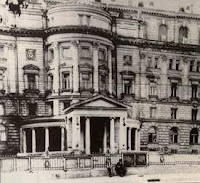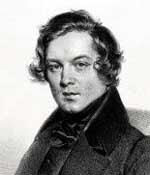August
Porpora, Nicola Antonio
Date
Born- Naples 17th August, 1686
Died -Naples 3rd March, 1768
Died -Naples 3rd March, 1768
Nationality
Italian
Style/Baroque
Famous Works
whose most famous singing student was
the Castrato Farinelli. One of his other
students was composer Matteo Capranica
A celebrated composer and singing teacher,
Porpora's ability to set the Italian language to
music was internationally acknowledged during
his lifetime.
"…Porpora's Cantatas particularly the Recitatives,
are still regarded in Italy as models of perfectionfor narrative Music…
are still regarded in Italy as models of perfectionfor narrative Music…
The Cantatas of Nicolo (sic) Porpora have been always much esteemed, on account of the excellence of their Recitatives, and the good taste and truly vocal style of the airs…" 1 He numbered among his students Metastasio, Farinelli, Caffarelli, Antonio Uberti (known as "Porporino"), Regina Mingotti and the composer Franz Joseph Haydn.
Porpora was invited to London by a group of noblemen who were organizing the Opera of the Nobility (in competition with Handel)
Porpora was invited to London by a group of noblemen who were organizing the Opera of the Nobility (in competition with Handel)
July
Giovanni Bononcini
Date
Born - July 18,1670,Modena, Duchy of Modena
Died - July 9, 1747, Vienna
Nationality
Italian
Style/Baroque
Famous Works
His compositions include 300 cantate for solo voice , plus
sacred vocal works, including four Messe brevi (1688),
a Laudate pueri (1733), a Te Deum (1741), and
three sacred madrigals, and many
instrumental works
Son of the composer
Giovanni Maria Bononcini,
Giovanni Bononcini ,
a cellist and composer, was only eight years
old when his father died, whereupon he moved
to Bologna as an orphan. However, he went
on to establish himself in Italy as a composer
of oratorios, and then of opera.
He moved to Vienna in the service of
Leopold I and his successor, by whom he
was well rewarded. After a period in Rome
he was recruited in 1720 by the Earl of
Burlington to London, where he won initial
success butsuffered from the political
machinations of opponents. He finally
returned to Vienna, where he died in 1747.
Il_duca_di_Marlborough
Stage and Vocal Music
Bononcini was held in high contemporary
esteem as a composer of opera and of cantatas
for solo voice, genres in which he was prolific.
Euleo_Festeggiante
Instrumental Music
Bononcini’s instrumental works include trio sonatas
and sinfonie for various numbers of players.
JUNE
SCHUMANN ROBERT ALEXANDER
Dates
Born June 8, 1810 in Zwickau, Germany
Died July 29, 1856 in Bonn, Germany
Nationality
German
Style/Period
Romantic 1820-1910Famous Works
Four symphonies, a piano concerto,chamber music and music for solo piano
I
Schumann wanted to be a musician
from an early age,but his mother wanted
him to be a lawyer and persuaded him to
go to law school. He hated law school and
dropped out after a short time.
Then, Schumann became a live-in
student of Friedrich Wieck, a famous
pianist. It was during his studies to
become a concert pianist that he fell in
love with Wieck's daughter, Clara,
who was a famous pianist in her own
right. Her father refused to grant them
permission to marry so they went to court
to get legal permission. Robert and Clara
married and lived many happy years.
Bio
After Robert injured his ring finger, he became a
full-time composer. His most famous musical
compositions were for piano. He was also a writer
and published a music magazine called Neue
Zeitschrift Fur Musik (New Journal for Music). In it,
he wrote about music and composers of the day,
encouraging some and criticizing others.
Musicroom of Schumann
He was an intensely hard worker and suffered a
nervous breakdown in 1844. After many attacks
of depression and exhaustion, he asked to be sent
to an asylum outside the city of Bonn where he died
in 1856.
Grave of Robert and Clara Schumann at Bonn
Clara and Robert Schumann
May
Pyotr Il'yich Tchaikovsky
Dates
Born May 7, 1840 in Votkinsk, Russia
Died November 6, 1893 in St. Petersburg
Nationality
Russian
Style/Period
Romantic 1820-1910Famous Works
The Nutcracker Suite,
Swan Lake,
Romeo and Juliet,
The Sleeping Beauty,
1812 Overture,
Symphony #6 "Pathetique,"
and Piano Concerto in B-flat.
The Nutcracker

Sleeping beauty
Publicity shot of the original cast of Tchaikovsky's ballet, The Sleeping Beauty, St Petersburg: Mariinsky Theater, 1890. Carlotta Brianza starred as Aurora.
I
Bio
 Piotr (Peter) Tchaikovsky was the son of a wealthy mining engineer stationed in Russia. Although Piotr was taken care of by a French governess, Fanny Duback, he remained very close to his mother. At the age of 6, he began piano lessons. When he was 8, he was sent to a boarding school and missed his family greatly. His mother died when Piotr was 14 and this loss brought great sorrow to Piotr. By 19, he completed his law studies and was appointed to a job with the Ministry of Justice.
Piotr (Peter) Tchaikovsky was the son of a wealthy mining engineer stationed in Russia. Although Piotr was taken care of by a French governess, Fanny Duback, he remained very close to his mother. At the age of 6, he began piano lessons. When he was 8, he was sent to a boarding school and missed his family greatly. His mother died when Piotr was 14 and this loss brought great sorrow to Piotr. By 19, he completed his law studies and was appointed to a job with the Ministry of Justice. The pull of music never left him and he consequently gave up his government job and turned to the study of music at the age of 23. After two years of study he was appointed a professor of composition at the St. Petersburg Conservatory and began writing music in earnest. His Piano Concerto in B-flat is one of the most famous pieces ever written for the piano. His music was very popular and he was in great demand as a conductor.
The pull of music never left him and he consequently gave up his government job and turned to the study of music at the age of 23. After two years of study he was appointed a professor of composition at the St. Petersburg Conservatory and began writing music in earnest. His Piano Concerto in B-flat is one of the most famous pieces ever written for the piano. His music was very popular and he was in great demand as a conductor.In 1891, he traveled to America where he was invited to conduct the New York Symphony at the opening of Carnegie Hall. Tchaikovsky died from cholera in St. Petersburg on November 6, 1893.
Swan Lake - Tchaikovsky
APRIL
Johann Friedrich Fasch
DATES
Born: April 15, 1688
Buttelstedt near Weimar, Thuringia, Germany
Died:December 5, 1758
Zerbst,Saxony-Anhalt, Germany
NATIONALITY
GermanHe was a German composer. He was born in Buttelstädt, was a choirboy in Weissenfels and studied under Johann Kuhnau at the Thomasschule in Leipzig (he later founded a Collegium Musicum in the city). He then traveled throughout Germany, becoming a violinist in the orchestra in Bayreuth in 1714, and also holding court posts in Greiz and Lukavec. In 1722 he was appointed Kapellmeister at Zerbst, a post he held until his death.
Happy Easter
Happy Easter
Church Music
Fasch's church music includes twelve cycles of church cantatas, psalm-settings and Masses.
Happy Easter
He was equally prolific as a composer of instrumental music. He wrote some ninety overture-suites, 68 concertos, nineteen symphonies and eighteen trio sonatas. Much of his work shows a development of instrumental style from the three-movement concerto of Vivaldi to the early classical.
His works include cantatas, concertos, symphonies and chamber music. None of his pieces were printed in his lifetime, and a large number of his vocal works, including four operas, have been lost. However, he was held in high regard by his contemporaries (Johann Sebastian Bach made manuscript copies of a number of his pieces), and he is today considered an important link between the Baroque and Classical periods.
Happy Easter
A view of the Dresden Frauenkirche. Johann Friedrich Fasch looked to late-Baroque Dresden for inspiration.
Photo: Stuck in Customs
Fasch died in Zerbst at the age of 70.
Johann Friedrich Fasch was the father of Carl Friedrich Christian Fasch, also a musician.
Johann Friedrich Fasch was the father of Carl Friedrich Christian Fasch, also a musician.
H a Happy Easter H P Y
Happy Easter
Happy Easter
Happy Easter
Happy EasterHappy Easter
Happy Easter
March
Johann Sebastian Bach
Dates
Born March 21, 1685 in Eisenach, Germany
Died July 28, 1750 in Leipzig, Germany
Died July 28, 1750 in Leipzig, Germany
Nationality
German
Style/Period
Baroque 1600-1750
Famous Works
The Well Tempered Clavier, St. Matthew Passion,
B-Minor Mass and St. John Passion
Bio
Bach once had to spend a month in jail because he tried to quit his job composing and playing for a duke. During that month in jail, he wrote forty-six pieces of music, many of which are still performed today.
Bach, a dazzling organist and church musician, had to compose all kinds of original pieces for every church service including pieces for choir, organ, harpsichord and orchestra. Since most of his music was written to be performed in a church service only once and then thrown out, very little of his music was published during his lifetime. It was for this reason that Bach composed more music than almost any other composer. However, his musical genius was not recognized until about 100 years after his death.
Bach was famous for his music and for something else - Bach had twenty children! Five were named Johann, two Johanna and four grew up to become famous composers. He may be remembered long after other composers because in 1977, the Voyager spacecraft was launched into space carrying recordings of three pieces by Bach.
Johanne Sebastian Bach
and the Coffee Cantata
It was the 1730's and Bach was living and working in Leipzig, Germany. He was a teacher and music director at St Thomas School, a boarding school for boys, and was director of a certain Musica Collegium that met and performed at Zimmermann's Coffee House on Fridays each week. Coffee and coffee houses were popular in Germany at that time, and Picander (the pseudonym of the poet Christian Friedrich Henrici who wrote the words for many of Bach's Cantatas) had written a satire about a young woman, her love of coffee, and her father's attempts to keep her from drinking it. In about 1734, Bach set Picander's libretto to music and created the Coffee Cantata (BWV 211) Schweigt stille, plaudert nicht (Be still, don't talk).
Ah! How sweet the coffee's taste is,
Sweeter than a thousand kisses,Milder than sweet muscatel.
Coffee, coffee, I must have it,
And if someone wants to treat me,
Ah, my cup with coffee fill!
Zimmermann's coffee house at Katharinenstrasse 14.
The Coffee Cantata was probably performed here first,
in about 1734, by Bach and his Musica Collegium.
It may have been an "advertisement" for Zimmermann.
Zimmermann's coffee house
Bach In A Minute
Bach is regarded by most musicians as a genius of Western music.
He was a brilliant improviser on the organ and an accomplished harpsichordist.
Hugely prolific, he wrote at least one cantata for every Sunday of the year.
Brahms described Bach's Chaconne (BWV.1004) as containing 'a whole world of the deepest thoughts and the most powerful feelings'.
He walked 200 miles to study with the great Danish organist Buxtehude.
He shocked audiences with his 'theatrical' setting of the Passion story.
Of his many children several also became composers, notably CPE Bach and JC Bach (the 'London' Bach).
Bach (left) with three of his sons
family at morning music practice. Bach is at
the keyboard and the other family members
are playing or singing.


































